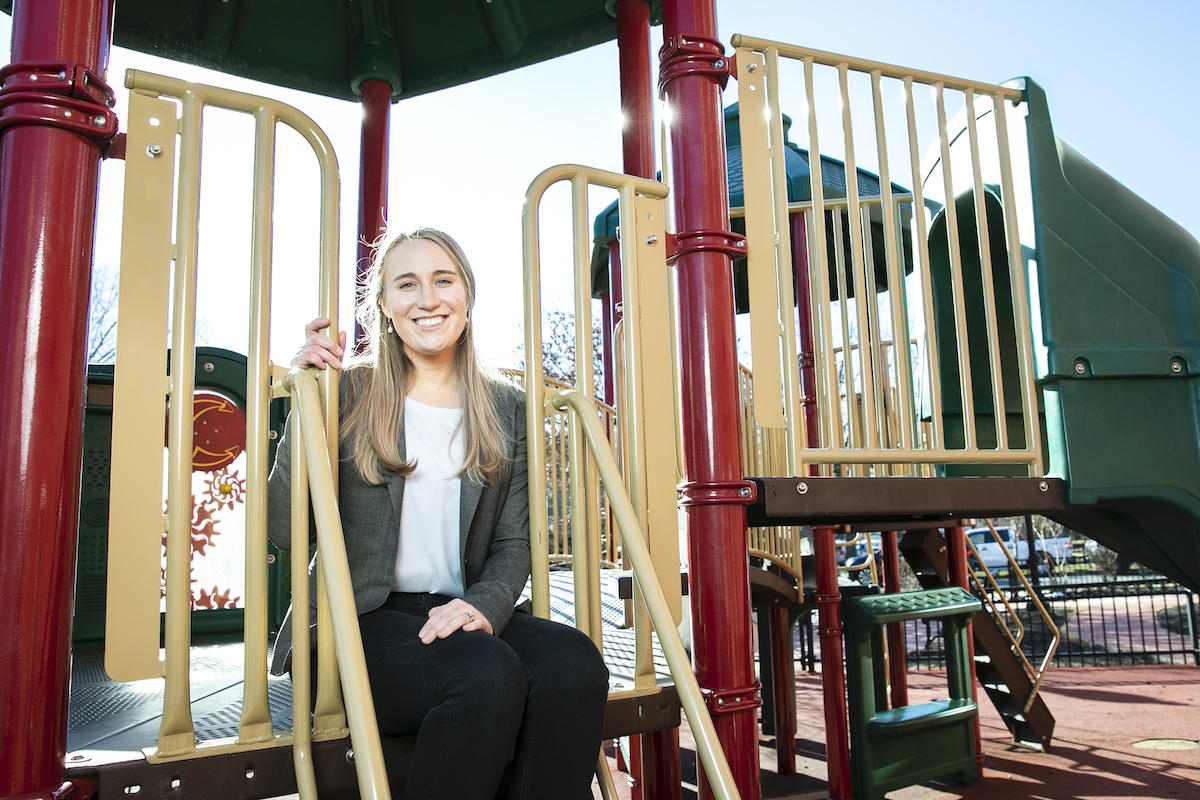A parent who suffers from post-traumatic stress disorder (PTSD) can affect the whole family. A George Mason University researcher is looking at the effects of such stressors on children ages 6-12 and their emotional functioning.
With the support of an F31 National Research Service Award from the National Institute of Child Health and Human Development at the National Institutes of Health, Mason doctoral student Sarah Giff is examining the connection between parents with PTSD and their children’s emotional functioning, looking specifically at military families.
Giff, who is working on a PhD in clinical psychology in Mason’s Department of Psychology, said that the negative impacts on emotional functioning can be “internalizing,” such as anxiety and depression, or “externalizing,” with the child showing anger or acting out in some way.
“This construct of emotion socialization has three components: how parents model emotions for their children, how parents respond to their children's display of emotions, and how parents talk to their children about emotions,” said Giff, who earned an MA in psychology from Mason in 2017.
Her research involves watching videos of parent-child interactions that were collected by researcher Abigail Gewirtz at the University of Minnesota. Giff is coding these videos for specific types of behavior seen throughout the exchanges, such as if a parent responds in a supportive manner to a child expressing emotion. The goal is to see if there is a link between military servicemembers who are struggling to regulate their emotions as a result of PTSD and potential difficulties with helping their children control their own feelings.
Giff’s inspiration behind the study was a combination of prior PTSD research for her master’s thesis, along with PTSD-related research by her dissertation director, Mason psychology professor Keith Renshaw.
“Best estimates show that roughly 10%-15% of veterans currently meet criteria for PTSD, with more who show some symptoms but don’t meet full criteria for a diagnosis,” said Renshaw, who leads the Military, Veterans, & Families Initiative at Mason and is an expert on the interpersonal dynamics of servicemembers and their families. “These symptoms, such as withdrawing from others and feeling emotionally numb, can have negative effects on relationships with family and friends, particularly partners and children.”
Giff believes her research will have broader applications to the general public and has been thinking specifically about frontline workers during COVID-19.
“There are high stress situations being created for families during COVID-19, especially if there is a family member who is working at a hospital every day and experiencing severe burnout,” said Giff. “We believe this research could help better educate and equip families facing these kinds of overwhelming challenges.”
With her research, Giff aims to raise awareness about the impacts of PTSD, both at the individual and family level.
“What I want to bring to light is when one person is enduring a burdensome level of stress, their family members may experience changes in their emotions and behavior, which can influence the course of treatment,” said Giff. “Ideally, I'd like to better implement ways to help treat mental health issues with a family context in mind.”
Giff has worked at the Psychosocial Rehabilitation and Recovery Center (PRRC) at the Washington, D.C., VA Medical Center. Prior to attending Mason, she gained clinical research experience at the Corporal Michael J. Crescenz VA Medical Center in Philadelphia and the Center for Autism Research at the Children's Hospital of Philadelphia.
Giff credits the clinical training she received at Mason’s Center for Psychological Services as the catalyst for getting her involved in military-related research, particularly its collaboration with the Virginia Veteran and Family Support.
“There is so much more we need to learn about how PTSD symptoms can affect children and families as a whole,” said Giff. “I enjoy contributing to knowledge about how we help veterans and servicemembers recuperate from PTSD and how to form a supportive home environment for their recovery.”

